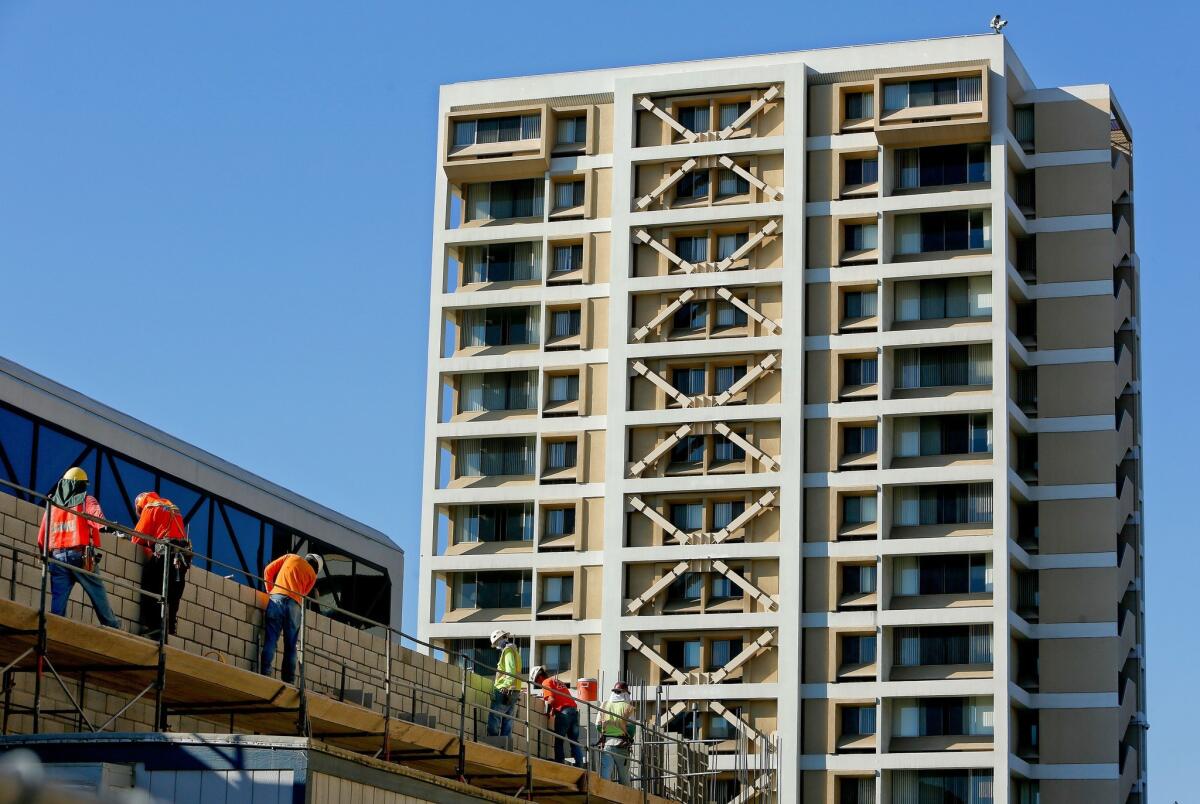Mayor Garcetti vows action on earthquake safety issues

Mayor Eric Garcetti said Thursday he was considering a new “chief resilience officer” to oversee preparations for a major earthquake and ensure Los Angeles can minimize the disaster’s damage.
Garcetti’s suggestion for a top coordinator of earthquake issues came as he prepares to announce what he called “some very concrete steps” to enhance seismic safety in a city with a long history of deadly temblors.
“The problem is there are lots of different pieces of this, but there’s nobody at City Hall who ultimately is kind of the earthquake expert, so I’m looking at that,” Garcetti said.
IN DEPTH: Concrete buildings across L.A. are at risk
Los Angeles has an elaborate disaster response protocol. But a developer’s plan to build two skyscrapers flanking the iconic Capitol Records building on what may be an active earthquake fault in Hollywood has raised new questions about the city’s seismic protections.
And a Times report this week that more than 1,000 old concrete buildings in Los Angeles may be at risk of collapsing in a big earthquake sparked calls by City Council members to investigate the problem and explore options for structural upgrades. The cost to property owners -- and potentially tenants -- would be enormous.
“I think it’s a solvable problem,” Garcetti said Thursday on a visit to South L.A. “Now, it won’t be easy. But if we attack this as a community issue rather than an economic one, I truly believe, just as they did in San Francisco and other places, that we can figure out a way to help building owners make their buildings safer.”
Garcetti met with U.S. Geological Survey seismologist Lucy Jones on Wednesday. He said he expected Jones to play a key role in convening a group to work on earthquake safety challenges. The plan would be to look not just at seismic retrofits of unsafe buildings but at the full gamut of earthquake preparations. “We’re going to try to do a more comprehensive thing,” he said.
Until this week, Garcetti had said little publicly about earthquake planning. But on Thursday he said his administration had been working on the issue “at a pretty fast pace” since the day he took office in July. “I have a very strong sense of urgency about this,” he said.
In an interview, Jones said many of the region’s older concrete buildings were “certain to come down” in a bad earthquake. “The implications of them coming down are much bigger than just the losses in the building,” she said.
In addition to the injuries and deaths, the economic disruption from shut businesses and the surge in homelessness would be huge, she said. The region must also address potential damage to its water distribution system and freeway network, she added.
“We really need to bring together the experts who can say, ‘These are what the issues are, here’s what the risks are, here’s what the financial issues are, here’s what policy tools are available,’” she said.
In San Francisco, Mayor Ed Lee had the city draft a 30-year plan to get vulnerable buildings strengthened. In April, San Francisco passed a law requiring thousands of owners of wooden apartment buildings to retrofit the structures. Lee also hired an earthquake czar, Patrick Otellini, to manage the city’s quake policy -- a position unlike any in Los Angeles.
The concept of a “chief resilience officer,” as Garcetti put it, has been promoted by Bloomberg Philanthropies and the Rockefeller Foundation as a key part of preparations that cities should make to bounce back from earthquakes, hurricanes and other natural disasters.
Thomas Heaton, director of Caltech’s Earthquake Engineering Research Laboratory, said the issues facing Garcetti were similar to what occurred after the 1971 Sylmar quake. The result was mandatory retrofits or demolition of the city’s more than 8,000 unreinforced brick buildings.
“It was a big success, but it was painful to go through it,” he said.
Since the 1994 Northridge earthquake, fading memories and budget constraints have slowed the momentum for seismic safety in the Los Angeles area. “Right now,” Heaton said, “one of the biggest problems is that the occupants of the buildings have no idea that they’re in harm’s way.”
ALSO:
New runway cracking, LAX sues contractors
Orange County D.A. raids police union law firm, seizes records
L.A. Councilman Jose Huizar is sued by staffer for sexual harassment
More to Read
Sign up for Essential California
The most important California stories and recommendations in your inbox every morning.
You may occasionally receive promotional content from the Los Angeles Times.












